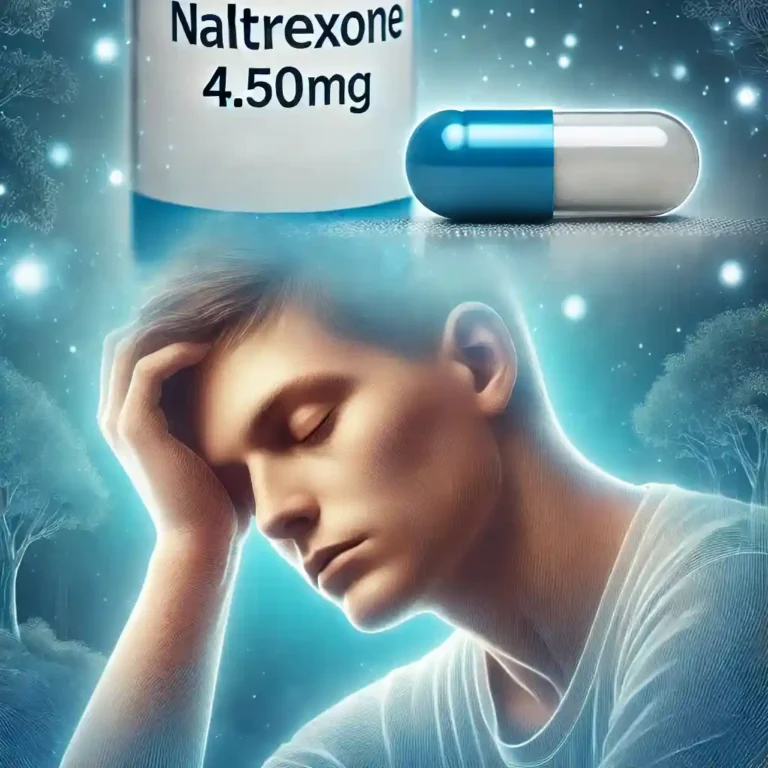Naltrexone, particularly at the 4.50mg dose, is often used for conditions like chronic pain, autoimmune diseases, and mental health issues. However, some people report feeling extremely tired after starting or adjusting their dose. This post explores why that might happen, what you can do to manage the fatigue, and when to talk to your doctor.
What to Expect in This Post
- Overview of Naltrexone and its 4.50mg dose
- Why naltrexone might cause extreme tiredness
- Tips for managing fatigue
- Frequently asked questions
Introduction: What Is Naltrexone 4.50mg?
Naltrexone is a medication originally developed for treating opioid addiction. But, in low doses, such as 4.50mg, it’s increasingly used for other health issues like autoimmune conditions, chronic pain, and inflammation. This lower dose is often referred to as Low Dose Naltrexone (LDN).
While naltrexone at this dose can be effective, some users report feeling very tired, especially when they start taking it or increase their dose. This can be surprising and frustrating, especially if you’re using it to manage chronic health issues that already leave you feeling low on energy.
Why Does Naltrexone Make Some People Extremely Tired?
Understanding why naltrexone can make you tired requires looking at how the medication works in the body. Here are a few potential reasons:
1. Adjustment Period
- When you start a new medication, your body often goes through an adjustment period. This can result in fatigue as your body adapts.
- This side effect often fades after a few weeks as your body becomes accustomed to the medication.
2. Immune System Activation
- Low Dose Naltrexone works by influencing the immune system and reducing inflammation, which can sometimes lead to increased tiredness as your body adapts to these changes.
- For those with autoimmune or chronic conditions, your body may use more energy in the healing process, leading to a feeling of fatigue.
3. Impact on Sleep Cycles
- Some studies suggest that naltrexone may influence the body’s natural sleep cycles, particularly REM sleep.
- If you’re taking it at night, this disruption could be why you’re feeling more tired, as you may not be getting the deep, restorative sleep you need.
4. Individual Sensitivity
- Some people may simply be more sensitive to medications than others. If you tend to react strongly to medications, you might experience more pronounced tiredness with naltrexone.
Tips to Manage Fatigue on Naltrexone 4.50mg
If you’re feeling excessively tired on naltrexone, here are a few tips that might help you manage the fatigue:
1. Try Taking It at a Different Time
- If you’re currently taking naltrexone in the morning, try switching to the evening or vice versa. Sometimes changing the timing of your dose can make a big difference.
- Some people find they’re less tired if they take it right before bed, as any drowsiness happens while they’re already sleeping.
2. Monitor Your Sleep
- Since naltrexone may impact sleep cycles, try tracking your sleep patterns. Apps like Sleep Cycle or a fitness tracker can help you see if your sleep is being disrupted.
- Make sure you’re practicing good sleep hygiene, such as going to bed at a regular time and creating a restful sleep environment.
3. Stay Hydrated and Eat Nutritious Foods
- Fatigue can be worsened by dehydration and poor diet. Make sure you’re drinking plenty of water and eating a balanced diet, focusing on nutrient-rich foods.
4. Pace Yourself
- If fatigue is especially strong in the early weeks of taking naltrexone, it may help to take breaks and pace yourself throughout the day.
- Be kind to yourself and allow extra rest as your body adjusts to the medication.
5. Consult Your Doctor
- If your fatigue persists or worsens, it’s important to check in with your doctor. They may suggest adjusting your dose or trying a different approach to manage your fatigue.
How Long Will the Tiredness Last?
For many people, the tiredness that comes with starting naltrexone fades after a few weeks. Your body may simply need time to adjust to the medication. If the tiredness lasts longer than a month or becomes too disruptive to daily life, consult with your doctor for further guidance.
Conclusion: Balancing the Benefits with Side Effects
While naltrexone at a 4.50mg dose can be helpful for various conditions, it’s not without its side effects. Feeling extremely tired can be frustrating, but remember that this is a common side effect that often decreases over time. With a few adjustments and a little patience, you may find that the benefits outweigh the initial fatigue.
FAQs About Naltrexone 4.50mg and Fatigue
1. How long does the fatigue from naltrexone last?
Fatigue usually improves after a few weeks, but it can vary from person to person. If it doesn’t improve, talk to your doctor.
2. Can I take naltrexone at night to avoid tiredness?
Yes, many people find taking it at night helps, as any drowsiness happens while they sleep.
3. Why does naltrexone make me feel tired?
The fatigue can be due to your body adjusting, immune system changes, or possible effects on sleep cycles.
4. What can I do to reduce fatigue from naltrexone?
Try adjusting your dose timing, monitor your sleep, stay hydrated, and consider consulting your doctor for advice.
5. Will the benefits of naltrexone outweigh the fatigue?
For many people, yes. The tiredness often lessens over time, allowing the benefits of the medication to become more noticeable.
Naltrexone can be a powerful tool for managing chronic conditions, but if you’re struggling with tiredness, know that there are ways to manage it. With time and the right approach, you may find that naltrexone helps you feel better overall.

